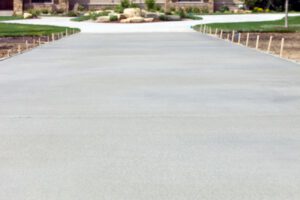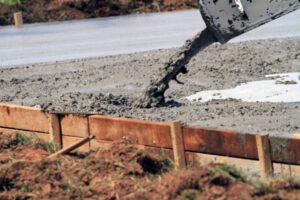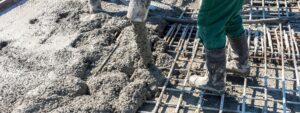
When it comes to building a concrete driveway, one crucial factor that often gets overlooked is its thickness. The standard driveway thickness you choose can have a significant impact on its durability, longevity, and overall performance. In this guide, we’ll explore the importance of having a thick concrete driveway, factors to consider when determining the right thickness, and how it affects the driveway’s durability. How thick is a concrete driveway? Understanding the answer to that question is key to a successful project.
Importance of Concrete Driveway Thickness

Concrete driveway depth is the foundation of a durable and long-lasting driveway. Here’s why it’s so important:
1. Load-Bearing Capacity
The thickness of your concrete driveway determines its ability to withstand the weight of vehicles, especially heavy ones. Insufficient thickness can lead to cracking and premature damage.
2. Durability
A thicker concrete driveway is more resistant to wear and tear, ensuring it remains in excellent condition for years to come. This means fewer repairs and less maintenance over time.
3. Weather Resistance
Concrete driveways are exposed to the elements, including freeze-thaw cycles. Proper thickness helps prevent damage caused by expansion and contraction during temperature fluctuations.
4. Cost-Efficiency
While thicker concrete may initially cost more, it often proves cost-effective in the long run, as it reduces the need for frequent repairs and replacements.
The Concrete Driveway Thickness Factor to Consider

When determining the ideal thickness or depth of a concrete driveway, several factors come into play:
1. Type of Vehicles – Consider the types of vehicles that will use your driveway regularly. A standard passenger car can sit on a thinner concrete driveway than an RV or heavy-duty truck.
2. Soil Type – The composition and stability of the soil beneath your driveway affect the required thickness. Weak or unstable soil may necessitate a thicker concrete layer to prevent settling or cracking.
3. Climate – Climate plays a significant role in concrete driveway depth. In areas with extreme temperature variations, such as freezing winters, a thicker driveway can better withstand the stresses of freeze-thaw cycles.
4. Usage – How you intend to use your driveway matters. If it’s merely for occasional car parking, a standard thickness may suffice. However, if you plan to use it to store a boat, RV, or other heavy activities, a thicker driveway is advisable.
How Concrete Driveway Thickness Impacts Durability

Understanding how the thickness of concrete driveway affects durability is essential for making an informed decision:
- A driveway with insufficient thickness is more susceptible to cracking, especially under heavy loads. Cracks can allow water to seep in, leading to further damage. Thin driveways may require more frequent repairs, increasing long-term costs.
- For most residential applications, a standard driveway thickness of about 4 inches is suitable. It can withstand the weight of passenger vehicles and provides reasonable durability.
- If you have larger vehicles, live in an area with harsh weather conditions, or want a driveway that lasts for decades with minimal maintenance, opting for a thicker concrete driveway, such as 6 inches or more, is a wise choice. It offers superior strength and resilience.
- In some cases, adding reinforcement like steel mesh or rebar can enhance the durability of your concrete driveway, even if you opt for a standard thickness.
Compliance Guidelines for Concrete Driveway Thickness
It’s essential to adhere to local building codes and regulations when determining the thickness of your concrete driveway. Non-compliance can result in costly fines and potential issues with your project. Here are some general compliance guidelines to keep in mind:

1. Check Local Regulations
Research your local municipality’s requirements regarding the depth that a concrete driveway should be. These regulations can vary, so it’s crucial to know what’s expected in your area.
2. Consult with Professionals
Engage with experienced Concrete contractors who are familiar with local building codes. They can help you determine the appropriate thickness and ensure your project meets all necessary regulations.
3. Obtain Necessary Permits
Depending on your location and the scope of your project, you may need permits. Make sure to secure these before starting work on your driveway.
4. Inspection and Approval
After your concrete driveway is installed, it may undergo inspection by local authorities to ensure it meets the required thickness and other specifications.
In Summary

The thickness of your concrete driveway is a critical factor in its performance and longevity. By considering factors like vehicle type, soil conditions, climate, and usage, you can determine the optimal thickness for your specific needs. Remember to adhere to local regulations and consult with professionals to ensure your driveway meets all standards. Investing in the right thickness of concrete driveway will pay off in terms of durability, reduced maintenance, and long-term cost savings, providing you with a reliable and attractive driveway for years to come.
Precision for All Concrete Features!
Precision Concrete is a highly skilled contractor specializing in concrete construction and related services. We excel in precision and expertise in various concrete applications, including foundations, driveways, sidewalks, and decorative concrete work. Experience first-class, precise results and services today by hiring us!






